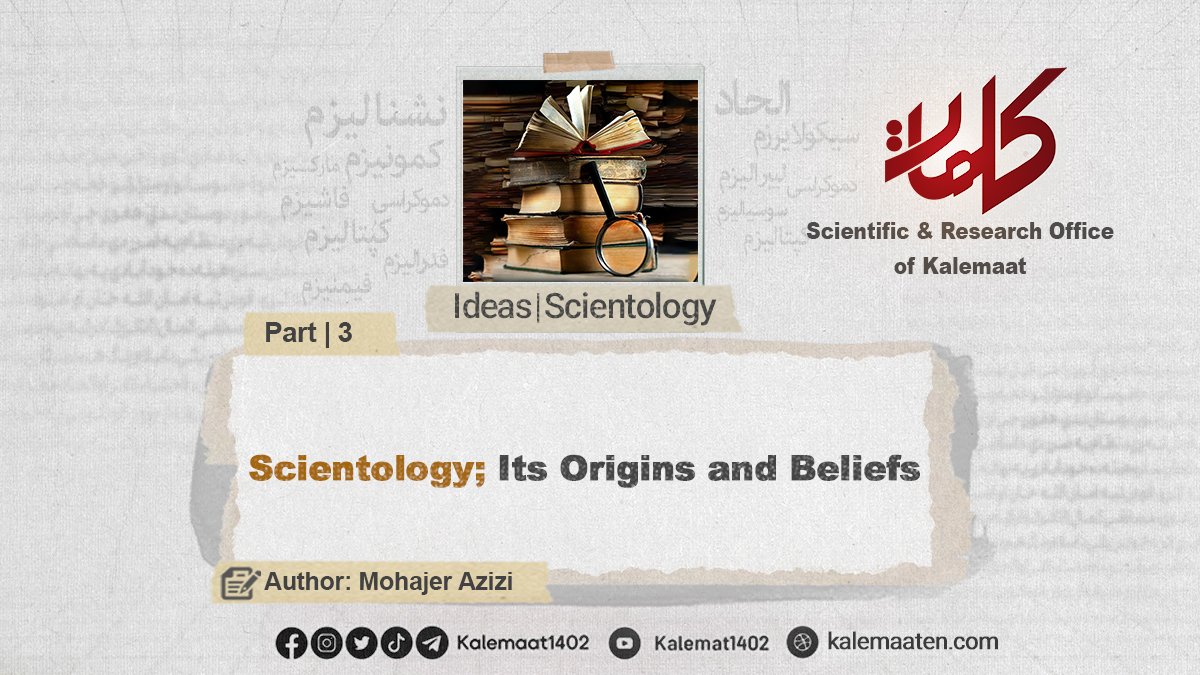Author: Mohajer Azizi
Scientology; Its Origins and Beliefs (Part 3)
The Church of Scientology
Every doctrine and belief system relies on a central institution to advance its structured goals and plans. After declaring Scientology a religion, L. Ron Hubbard established the Church of Scientology in 1954 as its central organization to promote his ideas and attract followers.
The Church of Scientology presents itself as a nonprofit organization devoted to the development and purification of the human spirit, as well as providing counseling programs. However, it has faced strong criticism from individuals, organizations, and even governments. For instance, in Australia, the Church of Scientology is recognized as a legal institution, yet due to allegations against it, it lacks a positive public image in Canada. Both the United Kingdom and Canada regard Scientology as a mysterious organization with dark intentions. Some European countries, such as Germany and France, consider it a commercial enterprise established for financial gain. Others see it as a dangerous sect and have restricted its activities. Some even claim it was founded to gain influence within governments.
Despite these criticisms, certain countries have recognized Scientology. The United States classifies the Church of Scientology as a public charitable organization and allows it to operate. In Europe, Italy, Spain, and Thailand have also granted it legal recognition. Nevertheless, its mysterious and potentially dangerous nature remains undeniable.
-
Objectives of the Church of Scientology
As the central institution of the Scientology faith, the Church pursues the following main goals:
1. Enhancing individual and societal levels:
The Church of Scientology claims that its aim is to help individuals achieve full personal power and reach what it calls the “Operating Thetan” (OT) state — a condition in which a person becomes completely free from the negative effects of the past (especially engrams, or painful subconscious memories) and gains full control over the mind and environment.
In simpler terms, Scientology teaches that humans are inherently joyful and enlightened beings, but their mental performance becomes impaired due to these engrams (psychological pains and traumas). Through special counseling sessions, courses, and seminars, Scientology claims to help individuals restore their mental clarity and happiness.
2. Improving society and communities:
The second major goal of Scientology is to improve society. It teaches that when individuals are healed, the community will naturally improve as well. Thus, its broader mission is to free the world from mental disorders, crime, war, and poverty — though from an Islamic perspective, such objectives are only achievable through adherence to the divine teachings of Islam. (This issue will be discussed in more detail in the section on “Beliefs and Doctrines.”)
3. Liberating the spirit (Thetan):
Scientology considers the human being to be a “Thetan” — an immortal spiritual entity that inhabits a physical body. The ultimate goal is the liberation of the Thetan from the cycle of birth and death and achieving complete awareness and power. In other words, Scientologists believe that the teachings of their faith can free human beings from spiritual and mental limitations.
-
Programs and Activities of the Church of Scientology
To achieve its objectives, the Church of Scientology employs the following programs and initiatives:
1. Auditing:
This is a counseling process in which an auditor uses a device called an electropsychometer (E-meter) to help individuals identify and neutralize negative memories, especially from previous lives.
According to Scientologists, this process is gradual, moving step by step until one reaches a higher level of awareness and ultimately a life of happiness and tranquility.
2. Social and cultural activities:
The Church conducts numerous programs to attract the public and promote Scientology. Among them are:
• Narconon, aimed at treating drug addiction.
• Criminon, designed to rehabilitate criminals.
• Applied Scholastics, which provides educational training.
3. Legal and political activities:
Besides its religious, social, and cultural work, the Church also operates in legal and political arenas, advocating for religious freedom and human rights—as it interprets them.
The Church has a special division for serving celebrities and influential individuals, successfully attracting several famous actors and artists such as John Travolta, Kelly Preston, Kirstie Alley, Beck Hansen, Jason Lee, and Tom Cruise.
Tom Cruise, a prominent Hollywood actor, became one of the most vocal supporters of Scientology in 2005. He publicly questioned the use of antidepressant drugs and criticized psychiatry during television appearances in 2004 and 2005. Following his comments, interviews with psychiatrists were conducted, and they admitted that the actual effectiveness of antidepressants remains unclear.
Critics argue that the Church treats celebrity followers far better than ordinary members, using their fame for propaganda and recruitment purposes. (Source: Salemi, Scientology, Negaah Research Journal, Issue 18, p. 80)[1]
4. The Galactic Plan:
At advanced levels of Scientology—especially OT III—bizarre beliefs are introduced, including the story of a galactic federation and a dictator named Xenu, who allegedly caused a massive genocide billions of years ago.
The Church considers access to these “sacred secrets” restricted to those who make large financial payments and show full loyalty to the organization.
-
Relationship between the Church of Scientology and Christian Churches
Scientology claims to be compatible with all world religions and to respect their teachings. However, in practice, it has had numerous conflicts with other Christian denominations. Reports indicate that it has clashed with the Church of England, the Russian Orthodox Church, and the Lutheran Church. These churches have repeatedly criticized and rejected Scientology because of its denial of Jesus Christ (peace be upon him).
According to these churches, Scientology holds bizarre and heretical views about Jesus. Indeed, Hubbard reportedly claimed that Jesus never actually existed, but rather was a collective memory implanted in humanity’s subconscious. Consequently, Scientologists also deny his divine mission.
For this reason, major Christian churches have long rejected Scientology and maintained a negative stance toward it.
continues…
Previous Part/ Next Part
References:
[1]. Salemi, Scientology, Negah Research Magazine, Issue 18, p. 80



